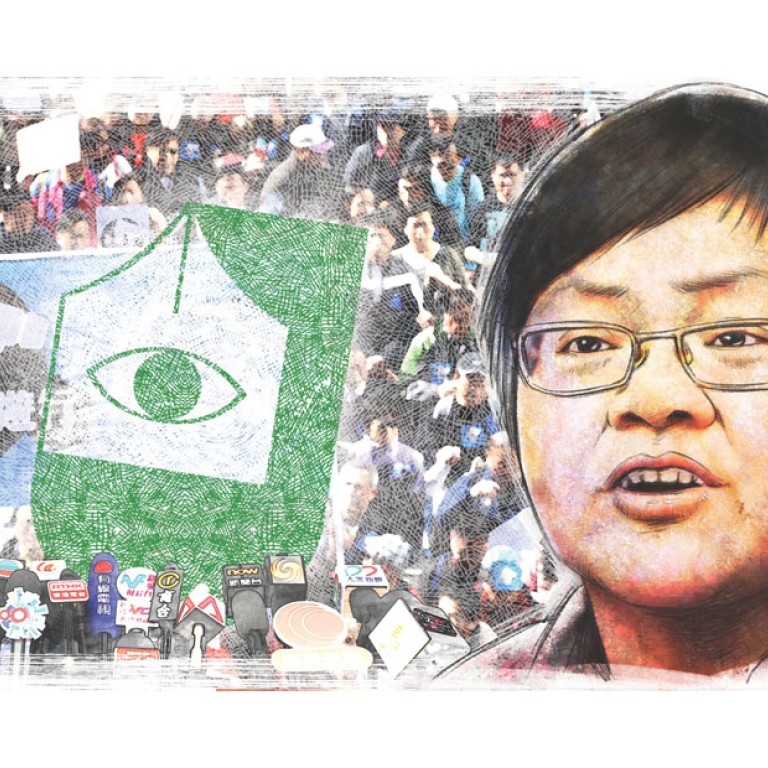
Media veteran Sham Yee-lan caught in a press freedom storm
Sham Yee-lan yearned for a peaceful semi-retirement - instead she is organising protests
Sham Yee-lan prayed for better times before she took up the role of Journalists Association chairwoman in July - a position seen as the last bastion of the fourth estate.
But it was not to be. Since autumn, the city has lurched from one media storm to the next. Sham, who had been hoping for a peaceful semiretirement, went from reporting on protests to organising them - one after the other.
Just yesterday, she was at it again, after former chief editor Kevin Lau Chun-to was critically injured in a chopping attack on Wednesday which the Chinese-language daily believes is related to its journalistic work. Police have yet to establish a motive for the attack.
Lau was ambushed as he got out of his car near a restaurant in Sai Wan Ho he frequents for breakfast. A pillion passenger leapt off a motorcycle and chopped him with a meat cleaver from behind, damaging crucial nerves in his legs. His condition has stabilised, but both the assailant and his motorcycle driver remain at large.
"The criminal is stabbing at our press freedom. [Journalists] are afraid - we are just ordinary men and women, of course we are afraid," Sham said.
"I'm furious; I'm shocked. It's an inexpressible feeling."
Sham swung into action, arranging meetings with industry groups - representing media owners, management, photojournalists and Beijing loyalists - and brokering a consensus to focus on condemning violence against journalists. The outcome was the formation of the "unprecedented alliance" which organised yesterday's march.
"We deserve freedom from fear in our reporting," she said, adding that interference "has always existed, but it is now in its ugliest form in three decades".
"A storm is gathering, but you don't know which direction it is coming from," Sham said.
The storm clouds have been gathering for a while - and strengthening since Sham, a part-time lecturer, started leading the association in summer.
On October 15, Hong Kong Television Network failed to obtain a free-to-air licence. Neither Chief Executive Leung Chun-ying nor the Executive Council offered a detailed explanation, despite a thousands-strong rally.
and free sheet , known for their critical stance against the government, reported unusual numbers of big firms - some backed by the mainland authorities - withdrawing their advertising.
Next to be hit was Li Wei-ling, an outspoken Commercial Radio host who was transferred from her prime-time slot in November. She was blamed for ruining workplace relations by criticising management and sacked on February 12. A 6,000-strong march ensued, partly to support her.
In between Li being moved and her dismissal came the news on January 6 of Lau's sudden replacement as chief editor by a Malaysian whom staff members regard as unversed in Hong Kong issues.
"I had never imagined any of this before," Sham said. "I prayed to God soon after I was chosen [as chairwoman]. I prayed that the field of journalism would be peaceful and uneventful, and I could have a comfortable job."
Instead, the state of media freedom appears to have spiralled downwards. But she took heart in the fact that the issue was not going unnoticed, with opinion polls showing that public satisfaction with freedom of expression had sunk to a new low.
But some are not convinced the chopping attack and recent rows have anything to do with press freedom. Among them is the chief executive's daughter, Leung Chai-yan, who whipped up a storm on Facebook by saying the assault on Lau was unrelated. Sham said in response: "What evidence is needed? [The attack] is apparently unrelated to personal affairs. Not money, nor women or a power struggle. Even has speculated it is because of the journalistic work."
It is unfortunate, she says, that Hong Kong is treading the same path as the mainland on silencing the media. "Hong Kong does not yet have a strong commercial enterprise as a monstrous media monopoly. But many media bosses have close business links with the mainland. Their interests are similar. I wonder if that's a de facto form of a monopoly."
Sham also dismissed the suggestion that the effect of colonial government interference on the media was greater than any self-censorship seen today.
She began her career as a political reporter in the 1980s, during the "good old days" when leaders including premier Zhao Ziyang respected Hong Kong journalists visiting Beijing.
She had planned to spend just a year with the association, but given the difficulties facing the profession, she says she may have to stay longer.
"It is time for a more rational approach to find a balance, especially as reporters themselves … have different ways of handling the same news.
"Society needs to be more rational and civilised."
Sham Yee-lan
Chairwoman, Journalists Association; part-time lecturer, Shue Yan University
, , , magazine
Bachelor of Journalism, Baptist College; Master of Arts in theological studies, Chinese University

